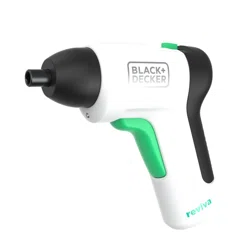Loading ...
Loading ...
Loading ...

5
ENGLISH
Important Safety Instructions for All
Integral Battery Charging
WARNING: Read all safety warnings, instructions,
and cautionary markings for the battery, USB
cable and product. Failure to follow the warnings
and instructions may result in electric shock, fire
and/or seriousinjury.
• The provided USB cable is not intended for any uses
other than charging BLACK+DECKER rechargeable
tools with
micro USB
ports. Charging other types of
tools may cause their batteries to overheat and burst,
resulting in personal injury, property damage, fire,
electric shock orelectrocution.
• Use only with the Listed/Certified Information
Technology (computer)Equipment.
• DO NOT expose USB cable to water, rain orsnow.
• Pull by the plugs rather than the cord when
disconnecting the USB cable. This will reduce the risk of
damage to the plugs andcord.
• Make sure that the cord is located so that it will not
be stepped on, tripped over or otherwise subjected to
damage orstress.
• When charging the tool outdoors, always provide a
drylocation.
• DO NOT use a USB cable with a damaged cord
orplugs. Have them replacedimmediately.
• Foreign materials of a conductive nature, such as, but
not limited to, grinding dust, metal chips, steel wool,
aluminum foil or any buildup of metallic particles
should be kept away from the USB and micro USB plugs
and port.
• Always unplug the USB cable from the power supply
when there is no tool attached toit.
BATTERY AND CHARGER
The battery is not fully charged out of the carton. Before using
the charger to charge the battery, read the safety instructions
below and then follow charging proceduresoutlined.
Ah ....................... amp hours
or AC ...........alternating current
or AC/DC .... alternating or direct
current
...................... Class II Construction
(double insulated)
n
o
.......................no load speed
n .........................rated speed
PSI....................... pounds per square
inch
......................earthing terminal
.....................safety alert symbol
..................... visible radiation
do not stare into
the light
..................... wear respiratory
protection
..................... wear eye protection
..................... wear hearing
protection
..................... read all
documentation
..................... do not expose to
rain
The label on your tool may include the following symbols. The
symbols and their definitions are asfollows:
V ......................... volts
Hz .......................hertz
min ..................... minutes
or DC ......direct current
...................... Class I Construction
(grounded)
…/min ..............per minute
BPM .................... beats per minute
IPM ..................... impacts per minute
OPM .................... oscillations per
minute
RPM .................... revolutions per
minute
sfpm ................... surface feet per
minute
SPM .................... strokes per minute
A ......................... amperes
W ........................watts
Wh ......................watt hours
Additional Safety Information
WARNING: Never modify the power tool or any part of
it. Damage or personal injury couldresult.
WARNING: ALWAYS use safety glasses. Everyday
eyeglasses are NOT safety glasses. Also use face or
dust mask if cutting operation is dusty. ALWAYS WEAR
CERTIFIED SAFETYEQUIPMENT:
• ANSI Z87.1 eye protection (CAN/CSA Z94.3),
• ANSI S12.6 (S3.19) hearing protection,
• NIOSH/OSHA/MSHA respiratoryprotection.
WARNING:
Some dust created by power sanding,
sawing, grinding, drilling, and other construction activities
contains chemicals known to the State of California to
cause cancer, birth defects or other reproductive harm.
Some examples of these chemicalsare:
• lead from lead‑based paints,
• crystalline silica from bricks and cement and other
masonry products, and
• arsenic and chromium from
chemically‑treatedlumber.
Your risk from these exposures varies, depending on
how often you do this type of work. To reduce your
exposure to these chemicals: work in a well ventilated
area, and work with approved safety equipment, such
as those dust masks that are specially designed to filter
out microscopicparticles.
• Wear protective clothing and wash exposed areas
with soap and water. Allowing dust to get into your
mouth, eyes, or lay on the skin may promote absorption of
harmfulchemicals. Direct particles away from face andbody.
• Use the appropriate dust extractor vacuum to remove
the vast majority of static and airborne dust. Failure
to remove static and airborne dust could contaminate the
working environment or pose an increased health risk to
the operator and those in closeproximity.
• Use clamps or other practical ways to secure and
support the workpiece to a stable platform. Holding
the work by hand or against your body is unstable and may
lead to loss ofcontrol andinjury.
• Air vents often cover moving parts and should be
avoided. Loose clothes, jewelry or long hair can be caught
in movingparts.
CAUTION: When not in use, place tool on its
side on a stable surface where it will not cause a
tripping or falling hazard.
Loading ...
Loading ...
Loading ...
